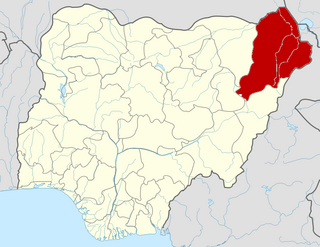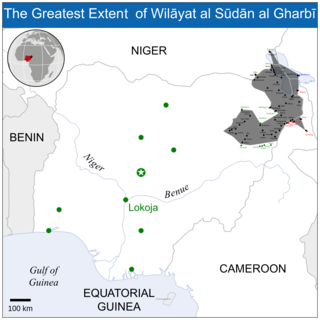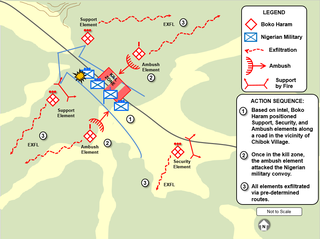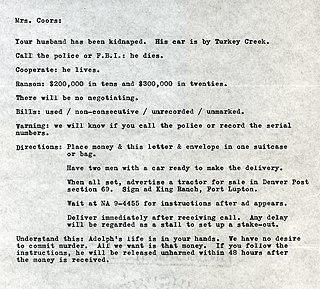Related Research Articles

Borno State is a state in the North-East geopolitical zone of Nigeria, bordered by Yobe to the west for about 421 km, Gombe to the southwest for 93 km, and Adamawa to the south while its eastern border forms part of the national border with Cameroon for about 426 km, its northern border forms part of the national border with Niger, for about 223 km mostly across the Komadougou-Yobe River, and its northeastern border forms all of the national border with Chad for 85 km, being the only Nigerian state to border three foreign countries. It takes its name from the historic emirate of Borno, with the emirate's old capital of Maiduguri serving as the capital city of Borno State. The state was formed in 1976 when the former North-Eastern State was broken up. It originally included the area that is now Yobe State, which became a distinct state in 1991.

Boko Haram, officially known as Jamā'at Ahl as-Sunnah lid-Da'wah wa'l-Jihād, is an Islamist jihadist organization based in northeastern Nigeria, which is also active in Chad, Niger, northern Cameroon, and Mali. In 2016, the group split, resulting in the emergence of a hostile faction known as the Islamic State's West Africa Province.
Chibok is a Local Government Area of Borno State, Nigeria, located in the southern part of the state. It has its headquarters in the town of Chibok.
Damboa is a Local Government Area of Borno State, Nigeria. Its headquarters are in the town of Damboa. It has an area of 6,219 km² and had a population of 233,200 at the 2006 census.

Gwoza is a local government area of Borno State, Nigeria. Its headquarters are in the town of Gwoza, a border town "about 135 kilometres South-East of Maiduguri." The postal code of the area is 610.

The Boko Haram insurgency began in July 2009, when the militant Islamist and jihadist rebel group Boko Haram started an armed rebellion against the government of Nigeria. The conflict is taking place within the context of long-standing issues of religious violence between Nigeria's Muslim and Christian communities, and the insurgents' ultimate aim is to establish an Islamic state in the region.
Timeline of the Boko Haram insurgency is the chronology of the Boko Haram insurgency, an ongoing armed conflict between Nigerian Islamist group Boko Haram and the Nigerian government. Boko Haram have carried out many attacks against the military, police and civilians since 2009, mostly in Nigeria. The low-intensity conflict is centred on Borno State. It peaked in the mid 2010s, when Boko Haram extended their insurgency into Cameroon, Chad and Niger.
The Konduga massacre took place in Konduga, Borno State, Nigeria on 11 February 2014. The massacre was conducted by Boko Haram Islamists against Christian villagers. At least 62 people were killed.

On the night of 14–15 April 2014, 276 mostly Christian female students aged from 16 to 18 were kidnapped by the Islamic terrorist group Boko Haram from the Government Girls Secondary School at the town of Chibok in Borno State, Nigeria. Prior to the raid, the school had been closed for four weeks due to deteriorating security conditions, but the girls were in attendance in order to take final exams in physics.

The Sambisa Forest is a forest in Borno State, northeast Nigeria. It is in the southwestern part of Chad Basin National Park, about 60km southeast of Maiduguri, the capital of Borno State. It has an area of 518 km².
On the night of 5-6 May 2014, Boko Haram militants attacked the twin towns of Gamboru and Ngala in Borno State, northeastern Nigeria. About 310 residents were killed in the 12-hour massacre, and the town was largely destroyed.

On the evening of 1 June 2014, an improvised explosive device was set off at a football field in Mubi, Adamawa State, Nigeria. At least 40 people were killed in the attack, according to eyewitnesses. Nineteen others were injured. The perpetrators of the attack were not clear, although media reports generally blamed Boko Haram.

The Gwoza massacre was a terrorist event that occurred on 2 June, 2014 in the Gwoza local government district, Borno State near the Nigerian-Camerounian border.
Shehu Mustapha Idrissa Timta was a Nigerian traditional leader who served as the 3rd Emir of Gwoza from October 1981 until his death in May 2014. He was killed in an attack by Boko Haram terrorists on May 30, 2014.

Between 23 and 25 June 2014, a series of attacks occurred in central Nigeria. On 23–24 June, gunmen attacked a number of villages in Kaduna State, killing around 150 people. The attack was blamed on Fulani tribesmen. On 25 June 2014, a bomb exploded at the Emab Plaza in the national capital of Abuja, killing at least 21 people. In response to the bombing, the Nigerian military raided two militants camps on 26 June, killing more than 100 people.
The following lists events from 2014 in Nigeria.
The 2015 Baga massacre was a series of mass killings carried out by the Boko Haram terrorist group in the north-eastern Nigerian town of Baga and its environs, in the state of Borno, between 3 January and 7 January 2015.

Starting in late January 2015, a coalition of West African troops launched an offensive against the Boko Haram insurgents in Nigeria.

The Chibok ambush was an attack of Boko Haram insurgents against a Nigerian Army convoy in the night from 13 to 14 May 2014, as the latter was searching for schoolgirls who had been kidnapped by the Islamist rebels. Even though the Nigerian Army forces managed to extricate themselves from the ambush, the attack seriously affected the morale of the involved soldiers who felt that their leadership was carelessly sacrificing them in the war against the insurgents. As result, elements of the Nigerian Army's 7th Division subsequently mutinied at Maiduguri and almost killed their own commander, "humiliat[ing] the Nigerian military".

Kidnapping is a major problem in Nigeria in the early 21st century. Kidnapping by bandits and insurgents is among the biggest organised or gang crime in Nigeria and is a national security challenge.
References
- ↑ McElroy, Damien (6 July 2013). "Extremist attack in Nigeria kills 42 at boarding school". The Daily Telegraph . Retrieved 3 October 2013.
- ↑ "Nigeria school attack claims 42 lives". The Australian . Agence France-Presse. 6 July 2013. Retrieved 3 October 2013.
- 1 2 3 Dorell, Oren (21 April 2014). "Terrorists kidnap more than 200 Nigerian girls". USA Today . Retrieved 23 April 2014.
- ↑ Aronson, Samuel (28 April 2014). "AQIM and Boko Haram Threats to Western Interests in the Africa's Sahel". Combating Terrorism Center Sentinel (CTC), West Point. Archived from the original on 13 May 2014. Retrieved 26 June 2014.
- ↑ "Boko Haram kills 59 children at Nigerian boarding school". The Guardian . 25 February 2014. Archived from the original on 26 February 2014. Retrieved 6 March 2014.
- 1 2 3 4 5 6 7 "Witnesses: Extremists abduct 91 more people in Nigeria in deadly weekend attacks on villages". Fox News Channel. Associated Press. 24 June 2014. Retrieved 25 June 2014.
- ↑ "Nigeria violence: 'Boko Haram' kill 27 in village attacks". BBC News. 21 May 2014. Retrieved 21 May 2014.
- ↑ Bayo Oladeji; Mohammed Ismail (3 June 2014). "Mubi Attack: Prayers Saved Me From Perishing In Bomb Attack – Survivor". Leadership. Retrieved 4 June 2014.
- ↑ Abdullah, Umar (5 June 2014). "Gwoza Under Siege - Boko Haram Kills 300, Wipes Out Three Villages" . Retrieved 28 June 2014.
- 1 2 3 4 "Suspected Boko Haram Militants Kidnap Dozens in Nigeria". Voice of America. 24 June 2014. Retrieved 25 June 2014.
- 1 2 "Nigeria denies latest mass abduction claims". Yahoo! News. Agence France-Presse. 25 June 2014. Retrieved 25 June 2014.
- 1 2 3 "Boko Haram kills 40 in Chibok villages". Nigerian Tribune. 23 June 2014. Archived from the original on 28 June 2014. Retrieved 26 June 2014.
- ↑ "Blast in northeast Nigeria kills 11: police". Daily Times . Reuters. 29 June 2014. Retrieved 29 June 2014.
- ↑ Stephanie Burnett (7 July 2014). "Report: More Than 60 Nigeria Girls Escape Boko Haram 'Captors'". TIME . Retrieved 7 July 2014.